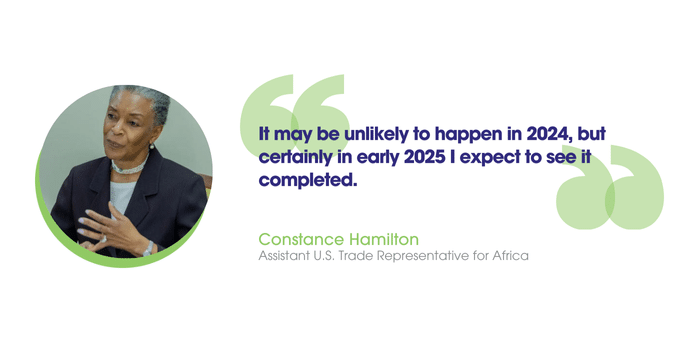According to Constance Hamilton, the United States’ Assistant Trade Representative for Africa, it is unlikely that the African Growth and Opportunity Act (AGOA) will be renewed before Americans hit the polls in November.
- AGOA is a U.S. trade program that provides duty-free policy to goods of designated African countries. It is set to expire in 2025.
- In June, Melissa Nelson, general counsel and corporate secretary for SanMar – PPAI 100’s No. 1 ranked supplier – testified before the United States Senate Committee on Finance in support of extending the AGOA.
In a briefing following a forum held regarding the AGOA, Hamilton stated, “As we look at the timeline and all the things that are happening here, it may be unlikely to happen in 2024, but certainly in early 2025 I expect to see it completed.”

Will The Decision Be Made Under A New Presidential Administration?
The push for a 10 or 16-year extension of the AGOA by companies like SanMar sooner rather than later is significant as the Biden administration voiced support of the act ahead of the recent forum, which was held in Washington.
“Here at home, AGOA has created investment opportunities and new markets for American businesses,” says Biden. “And on both sides of the Atlantic, AGOA has promoted sustainable economic growth and resilient supply chains.”
Congress could decide on an extension any time before the act expires 14 months from now. As far as the immediate future, that leaves three possibilities for such an action:
- An extension before November’s presidential election, which Hamilton has recently called “unlikely.”
- An extension in 2025 before the presidential inauguration, which still produces fewer unknown variables with an administration that has voiced support of the AGOA.
- A decision on the AGOA after the presidential inauguration in 2025.
The final possibility does not spell the end of the AGOA’s chances for survival. It simply means more uncertainty. Donald Trump’s record on foreign policy has made predictions difficult, and it is not entirely clear whether he would support a long-term extension of the AGOA – though it has seen bipartisan support as of late.
Likewise, with Biden having dropped out of the 2024 presidential election, there is no guarantee that Vice President Kamala Harris would support every act that he did if elected.

SanMar’s Case For The AGOA
To hear SanMar tell it, the AGOA plays a critical role in driving economic growth in the apparel industry, as well as the ways it creates jobs and decreases poverty in Africa. SanMar has a continued presence in Africa through its factory partnerships and programs.
Facts and perspectives on the subject that Nelson presented to the Senate include:
- SanMar first began sourcing apparel from sub-Saharan Africa in 2009.
- Through apparel production in five AGOA countries (Ethiopia, Kenya, Tanzania, Madagascar and Ghana), SanMar provides jobs to more than 9,000 Africans.
- Of the workers manufacturing products for SanMar in these countries, more than 70% of them are women.
- In order to move production away from China, sub-Saharan Africa provides a viable sourcing base, but this is dependent on the renewal of the long-term renewal of AGOA.
Nelson told Senators that a discontinuation of the AGOA would stop steady economic growth with greater potential in its tracks.
“Many potential investments in AGOA countries are on hold because the program is close to expiration,” Nelson told the Senate. “It’s a common discussion among apparel manufacturers who source from AGOA countries. There is so much potential in vertical integration, but no one will invest when the benefits of AGOA could expire before a return on investment.”


